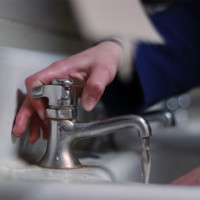
Names of students are replaced with letters for legal purposes.
On Feb. 20 of this year, Grant High School’s principal, Dr. Carol Campbell, sent out an email regarding Portland Public Schools’ (PPS) policy surrounding the use of drugs and alcohol on school property. This email specifically acknowledged that the usage of e-cigarettes and vaping devices falls under the same category as other drug paraphernalia.
The message was prompted by another email sent a week earlier by Brenda Martinek, the chief of Student Support Services in PPS, reminding students that the use of vaporizers on school grounds could result in suspension and/or a disciplinary hearing. These hearings can lead to students having to take classes about safety around drugs and alcohol, or a drug and alcohol assessment.
“I think it was an educational piece, but also sort of in response to what’s happening across the country,” Dr. Campbell says, regarding the goal of the email. “It’s a national concern for teenagers as far as their health and safety goes, so I think the district wanted to alert people that this is happening, this is going on; students are accessing these things that are really only available, or supposed to be available, to 21-year-olds.”
As of now, not much is known about the contents of most e-cigarettes or the potential negative health effects that could result from use, since there is limited scientific research on these devices. However, the majority of e-cigarettes contain nicotine, a highly addictive substance which can increase the risk of heart disease and cancer. According to Smokefree.gov, one third of all cancer deaths are caused by tobacco products, which contain nicotine.
Because of this, Grant’s administration is worried about the future health of students, with many adults concerned about a future of nicotine addiction. “You may not suffer some immediate severe consequences, but it’s highly addictive, so that’s not really something that we want to promote or we want to take lightly,” says Dr. Campbell
According to Michael Dunbar, a behavioral scientist at a nonprofit research organization called RAND, there is “evidence that young people who use e-cigarettes progress to smoking cigarettes in the future.”
This was the case for Grant senior, C. “I didn’t really start vaping until like my junior year,” he says. “I got addicted to cigarettes over the (following) summer and then I started vaping (again) because cigarettes smell bad. I definitely don’t suggest it. Kinda sucks.”
Many high schoolers are aware of the potential adverse side effects of vaping devices but choose to be indifferent toward them for a variety of reasons. “I’m sure everyone knows it’s bad for you,” says Grant freshman, B. “It’s more like, is it worth it? … I think a lot of kids … don’t really care at this point.”
Since the release of the JUUL in 2017, vaping has become increasingly common among high school and middle school students. A JUUL is a compact, rectangular e-cigarette containing nicotine. JUULs are marketed to help people quit smoking cigarettes, but with a range of sweet, candy-like flavors, JUULs have found their way into high school bathrooms, prompting a cultural
phenomenon among students.
“I think that companies like JUUL know that vaping is trending right now and are marketing to people that are under 18,” says Grant parent, Gwen Stover.
This knowledge is reflected in data from across the country. In 2016, the National Institute on Drug Abuse released survey results from 10th and 12th graders reporting that 14 percent of 10th graders and 16.2 percent of 12th graders used e-cigarettes. The same survey, done this year, found that 32.3 percent of 10th graders and 37.3 percent of 12th graders have reportedly vaped within the last year.
Data from the Centers for Disease Control and Prevention reflected a similar trend, citing that 1.5 million more middle and high school students vaped in 2018 than in 2017, with e-cigarette use increasing by 78 percent.
Numbers like this have prompted Grant Vice Principal Liz Mahlum to say that high school vaping has become a “national epidemic.”
With the popularity of e-cigarette devices continuing to grow, it is becoming increasingly easy for high schoolers to acquire one, despite the minimum age for purchasing vaping devices in Oregon being 21. “You can pretty much get anything, like everyone knows someone that can get anything for you,” says B. “I know people that their older siblings order them online and they’ll just sell them, and I even know kids who their parents got it for them.”
J, a junior, was influenced to buy a JUUL after seeing it in social settings. “I liked the idea of the smoke and I thought … everybody had it, so I felt like I should have gotten one and then I did,” she says.
Many others who vape also cite feeling that vaping was socially advantageous as a reason why
they began to vape. “(My) freshman year, I remember seniors started getting JUULs and that’s when they started getting popular,” says C. “So I guess I saw that, looked up to it cause they were seniors and like my role models and stuff. (Now) every class I go to the bathroom and vape.”
In school settings, groups of students often vape in bathrooms to try and avoid being caught. However, this has not always been successful, with security guards running routine checks. “When you see a big … group of (students) go into a bathroom, it’s obvious what they’re going to do,” says anonymous junior, F.
Grant junior, L, was caught after walking into a bathroom with his friend during a flex period to vape, something he regularly does throughout the school day. While chatting with his friend and taking hits from his Novo, a small rectangular nicotine vaporizer device, one of Grant’s security guards walked in. The security guard immediately spotted L’s Novo.
The staff had no way to test the contents of his device and were unable to determine if he was under the influence, despite his vape only containing nicotine. Because of this, L was escorted down to the office and spent the last five hours of the school day there. During that time, he read a booklet which contained information about possible courses of punishment. For the rest of the day, L assumed he would be charged for simply using a device containing nicotine.
However, when he and his parents arrived at his hearing the next day, L was surprised to learn that his device was being treated as drug paraphernalia.
Because the use of vaping products is illegal for minors, the administration has increasingly felt pressure to enforce laws around vaping. With each case, they try to determine the most suitable course of punishment for the students who have been caught using these substances on school grounds.
When a student is caught vaping, they can either be suspended or assigned a hearing date. After a student’s hearing, they will often be assigned to go to Insight classes, meant to inform how to make safe and healthy choices regarding drugs, tobacco and alcohol. Other punishments include community service.
L was charged with four two-hour-long Insight classes and eight hours of community service. Since it was only his first offense, L was not suspended and was able to return to school the following day.
In the recent emails sent out, PPS and Grant administration aimed to clarify that the use of vaping devices falls under the category of drug paraphernalia, even if it only contains nicotine, simply because schools do not have any way to test the contents of these products. This information falls in line with the punishment that L was given after being caught the first time.
These emails also included links detailing information and statistics about vaping, allowing students and their families to educate themselves further.
“I appreciated it, the communication,” says Stover. “I thought it was proactive and I quite appreciated the information that was in there.”
However, not everyone felt this way. “I think it’s easy for them to send out a newsletter to parents,” says C. “It seems like to me the admin really care about what the parents think … I think it’s really easy to be like, ‘Oh there’s this big problem of vaping but we’re gonna fix it,’ instead of focusing on … these other problems at this school that don’t get any press.”
Use of vaping devices on school property in the future will be treated as a drug and alcohol violations, and student punishment will reflect this.
“As we progress, the technology to do things progresses, and things change and we will try to be responsive in those ways,” says Mahlum.




